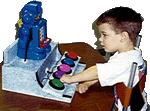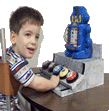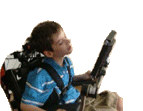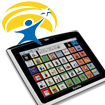Articles
Charlotte (NC) Observer - 1994
July 4, 1994
Jerry Wagstrom's granddaughter Emily was 3 when she wriggled onto
his lap and tried using a kiddie program on his computer.
The game, like many of the more than 700 educational children's
software programs, directs users to press a letter to make something
happen. That's fine for older kids who know their way around a
standard keyboard. But Emily Clippinger was too young. "The
frustration ... negated all the value of the software," Wagstrom
said, remembering that day about 18 months ago. "I thought,
something really could be done."
From his Huntersville home, he did it.
Kid Keys, a PC keyboard with oversize, colorful keys arranged in
alphabetical order, hit stores two months ago, priced at less than
$100. Educators, parents, software designers and computer retailers
across the country already are embracing it. There's also some
international interest.
"He's got something unique," said Carol Ellison, an editor for Home
PC magazine. "That's how a kid's keyboard ought to work. ... It's
like, why didn't somebody think of this before."
Wagstrom, 54, has been at the forefront of the computer industry all
his working life. In 1962, when computers were giant machines used
only by big business, he was writing software for one of IBM's first
major competitors.
Twenty years later, just after IBM introduced its first personal
computer, Wagstrom foresaw a need for custom software. So the
Minnesota native started a Los Angeles consulting company to design
small-business programs.
Three years ago, an Outer Banks vacation lured Wagstrom and wife
Katherine to North Carolina. He sold Wagstrom-Cartwright Computer
Consulting, but continued to fiddle with computers. With KidKeys,
his first hardware creation, Wagstrom joined the fledgling "technotyke"
industry that caters to children ages 2 to 6.
"We tend to see trends coming," Wagstrom said. "We had this market
pegged."
Numbers specific to the kiddie computer industry are hard to come
by, since it barely existed two years ago, but there is evidence it
has strong potential.
More than a quarter of U.S. homes have personal computers, and by
the year 2000, analysts expect computers to be humming in at least
half of all homes. Home PC, a monthly magazine designed to help home
computer users, just hit newsstands in May. Circulation already is
near 200,000.
"It's becoming a booming market," said Ellison, who tests software
and hardware with children ages 6 months to 14 years. "Kids do have
a natural interest in computers."
She urges moderation and warns against turning children into "technojunkies,"
holed up in their rooms, staring glassy-eyed at a computer screen.
"On the other hand, there's a lot of cool stuff that goes on in
computers," she said. "The kids' area especially is booming."
Saw a niche to be filled
After designing his keyboard, Wagstrom looked around to see if there
was anything similar. There wasn't, but that wasn't enough to keep
him going on the invention.
"For about 4 months, the project went dormant," he said. "I could
see the amount of work ahead of me to do it, and I really needed ...
to decide I was going to do it."
Combing The Observer's list of new patents one day, he found one for
a Raleigh woman who listed a kid's keyboard.
"I thought, 'There went another idea,'" said Wagstrom, but he
checked out the keyboard, and it wasn't close to what he envisioned.
"I said: I'm not going to let this one get away.'
" He persuaded a few people to invest in his idea, and in April last
year, Wagstrom started Greystone Digital to produce a keyboard
designed for little kids' fingers and limited reading ability.
After doing the engineering drawings, Wagstrom hunted for a
manufacturer. He intended to build in the United States, but
production costs were at least 40 percent higher than quotes
submitted by a company in Taiwan, a major hardware-producing
country.
"The toughest part was faxing back and forth to Taiwan and going
from millimeters to inches," Wagstrom said.
Sales slower than expected
Prototype boards, ordered last September, arrived in January. They
passed muster, so Wagstrom put about $100,000 into a production run
that filled his Charlotte warehouse in March.
The board requires no special software to operate and works with any
IBM-compatible PC. Later this year, Wagstrom plans to introduce a
board for Macintosh systems.
KidKeys' keys are 1-inch square, compared with standard half-inch
keys. The vowel keys are yellow, which stands out against the gray
background. Y, which also can be a vowel, is yellow just as the R
key is red, B is blue, and G is green.
But KidKeys' biggest selling point is the alphabetical order of its
keys.
"It's a great, great keyboard," said Kamal Nayfeh, owner of Computek,
a computer store on Tyvola Road. "It's so simple."
Nayfeh, who said his 2-year-old daughter quickly mastered the
keyboard, has sold about 50 of the $95 keyboards since he started
stocking them six weeks ago. That was more than he expected
especially since he didn't advertise.
Wagstrom planned for sales of 50,000 units this year. He's still
optimistic, but he said sales have been slightly slower than
expected.
"The big players take time," he said.
So far, his biggest order has come from a Los Angeles computer
distributor, who just bought 200 boards. Last month, Wagstrom
shipped two boards to a British distributor. Stores in New Zealand
and Australia also have called.
To help build his business, Wagstrom has relied heavily on industry
contacts. In an effort to make inroads in toy stores, where he has
no contacts, Wagstrom is working with the manufacturers' reps that
the big stores say they prefer to use. He's also trying to get into
Wal-Mart and Kmart.
Initially, Wagstrom targeted small computer stores, such as Computek,
with the information flyers he mailed all over the world.
"I thought that's where my market would be," he said.
Finding unexpected markets
Wagstrom was surprised to find a market among people working with
people who have disabilities.
"Computers are the great equalizers," said Judy Timms, director at
Carolina Computer Access Center. "They make it possible for people
with disabilities to communicate, verbally, written and otherwise.
" The center, at Charlotte-Mecklenburg's Metro School on East 2nd
Street, uses technology to help people with disabilities learn.
Timms liked Kid Keys right away.
Some software publishers and distributors, mostly in educational
fields, also like Kid Keys - another surprise for Wagstrom.
"It turns some possibly feared computing time into fun time," said
Ken Heptig, an owner of Software Express in Charlotte.
Software Express has a Charlotte retail store, but its main business
for the last four years has been selling software to schools.
Wagstrom's keyboard is one of the few hardware items listed in
Software's catalogue. That puts Wagstrom in place for a share of the
quickly growing home-educational software market, which saw sales
jump two-thirds from $146 million in 1992 to last year's $243
million.




